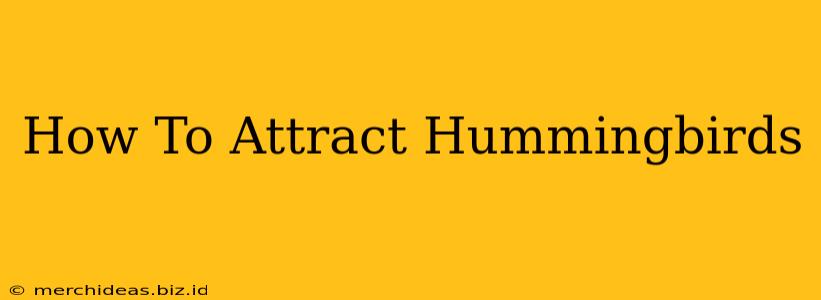Hummingbirds! These tiny, dazzling jewels of the avian world bring a burst of vibrant color and energy to any garden. Their rapid wingbeats and acrobatic feeding style are mesmerizing, making them a highly sought-after addition to any outdoor space. But how do you attract these fascinating creatures to your own backyard? It's easier than you might think! With a little planning and the right approach, you can transform your garden into a hummingbird haven.
Understanding Hummingbird Needs
Before we dive into attracting hummingbirds, it's crucial to understand their basic needs. These tiny dynamos require a constant supply of high-energy food, safe shelter, and suitable nesting sites.
Food: The Nectar Source
Hummingbirds primarily feed on nectar, a sugary liquid found in flowers. To attract them, you need to plant a variety of nectar-rich flowers that bloom throughout the hummingbird's active season. This ensures a continuous food supply.
-
Best Flowers for Hummingbirds: Consider tubular-shaped flowers in bright red, orange, pink, and purple hues. Hummingbirds are particularly attracted to these colors. Examples include bee balm, trumpet vine, fuchsia, salvia, and honeysuckle.
-
Flower Placement: Plant flowers in clusters for easier feeding and visibility. Avoid placing them in areas with strong winds that could make feeding difficult.
-
Supplemental Feeders: While flowers are the ideal food source, hummingbird feeders provide a valuable supplemental food source, especially during periods of low flower bloom. Choose feeders with red accents to attract them, and remember to clean and refill them regularly to prevent the growth of harmful bacteria and mold.
Shelter and Safety: Creating a Safe Haven
Hummingbirds need safe places to rest and escape from predators. Dense shrubs and trees provide crucial shelter.
-
Plant Native Shrubs and Trees: Native plants are best as they provide the most suitable habitat for hummingbirds and other beneficial insects.
-
Avoid Pesticides: Pesticides can harm hummingbirds and their food sources. Opt for natural pest control methods instead.
Nesting Sites: Encouraging Breeding
If you want to encourage hummingbirds to nest in your garden, provide them with the right environment.
-
Small Trees and Shrubs: Hummingbirds prefer to build their nests in sheltered areas within small trees and shrubs.
-
Avoid Disturbances: Once a nest is established, minimize disturbance to the area to encourage successful breeding.
Creating a Hummingbird-Friendly Garden: Step-by-Step Guide
1. Plant a Variety of Nectar-Rich Flowers: Aim for continuous bloom throughout the season.
2. Choose the Right Colors: Red, orange, pink, and purple flowers are most attractive.
3. Consider Flower Shape: Tubular-shaped flowers are ideal for hummingbirds' long beaks.
4. Provide Shelter: Plant dense shrubs and trees to provide safe resting and nesting areas.
5. Use Hummingbird Feeders (Supplementally): Clean and refill them regularly.
6. Avoid Pesticides: Opt for natural pest control methods.
7. Provide a Water Source: A shallow dish of water or a mister can provide a source of hydration.
8. Be Patient: It may take some time for hummingbirds to discover your garden, but with consistent effort, you'll eventually attract these beautiful creatures.
Beyond the Basics: Advanced Tips for Hummingbird Attraction
- Create a "Hummingbird Corridor": Plant a series of flowering plants in a line to guide hummingbirds through your garden.
- Offer a Variety of Flower Heights: This accommodates different hummingbird species with varying foraging preferences.
- Consider the Sun Exposure: Most hummingbird-friendly flowers thrive in full sun to partial shade.
- Educate Your Neighbors: Encourage them to create hummingbird-friendly gardens in their own yards, creating a larger network of food sources.
By following these tips, you can transform your garden into a vibrant, humming haven where these incredible birds will thrive and delight you with their beauty and energy. Happy gardening!
